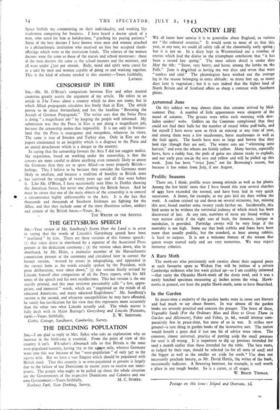COUNTRY LIFE
WE all know how unwise it is to generalise about England, so various are " the coloured counties." It would seem to most of us that this year, at any rate, we could all safely talk of the abnormally early spring ; but • it is not so. In a diary kept in Westmorland area number of entries which lead the diarist to the triumphant conclusion that " it has been a record late spring." The most salient detail is under date May the 6th: " Snow, very heavy, and havoc among the lambs on the Fells." June is devribed as having ten wet days and seven that were " sunless and cold." The phonologists have worked out the average lag in the season belonging to extra altitude : so many feet up, so many days later is vegetation ; but it is rare indeed that the higher land of North Britain and of Scotland offers so sharp a contrast with Southern plains.
Autumnal June On this subject we may almost claim that autumn arrived by Mid- summer Day. A number of _little appearances were eloquent of the mood of autumn. The grasses were white each morning with dew- laden spiders' webs. Golfers on the Common complained that they could not find their balls for the number of round white puff-balls, and for myself I have never seen so thick an outcrop at any time of year, and among them were a few mushrooms, horse mushrooms as well as the field agaric. The hazels have nuts so large and brown that they look ripe (though they are not). The winter oats are " whitening unto harvest," and even the wheats are faintly yellow. Many berries, especially haws, have a ruddy hue, the pods of gorse are almost ready to explode, and our early peas are..in the sere and yellow and will be pulled up this week. June has been " twice June," not for Browning's reason, but because it has stolen from July, if not August.
Prolific Seasons There are, I think, prolific years among animals as well as for plants. Among the few birds' nests that I have found this year several clutches of eggs have exceeded the normal, and have been laid in very quick succession. A linnet, for example, at my gate laid six days within the week. A cuckoo cruised up and down on several occasions, but, missing this nest, found another some twenty yards farther on. Incidentally, this bird seems to be without the territorial jealousy of which much has been discovered of late. At any rate, numbers of nests are found within a very narrow circle if the right sort of bush, for instance, juniper or mirobalan, is provided. Partridge coveys will be very large if the mortality is not high. Some say that both rabbits and foxes have been more than usually prolific, but the standard, at least among rabbits, is hard to surpass. It is not a welcome feature of the season that queen wasps started early and are very numerous. We may expect immense colonies.
A Rare Moth The moth-ere who persistently seek rareties about their sugared posts at such favourite spots as Wicken Fen will be jealous of a certain Cambridge milkman who last week picked up—so I am credibly informed —that rarity the Oleander Hawk-moth off the dusty road, and it was a newly hatched specimen measuring 41 inches across the wing. Hawk- moths in general, not least the poplar Hawk-moth, seem to have flourished.
In the Garden In peace-time a majority of the garden books were in some sort literary and had much to say about flowers. In war almost all the garden books are severely practical and concern the potager. The latest of these, Vegetable Seeds (For the Ordinary Man and How to Grow Them in Garden and Allotment), Faber and Faber, 3s. 6d., would interest com- paratively few in peace-time, but most of us in war. It strikes new ground—a rare thing in garden books of the instructive sort. The nation would benefit a great deal if just one bit of advice were taken. The common, almost universal, practice of putting aside the small potatoes for seed is all wrong. It is important to dig up potatoes intended for seed a month earlier than those intended for the table. The best roots, as judged by their tops, should be selected (as for all sorts of seed) and the bigger as well as the smaller set aside for seeds.• Use does not necessarily preclude beauty, as Mr. David Harris, the writer of the book, occasionally indicates. A flowering beetroot, for example, is well worth a place in any rough border. So is a carrot, at all stages.
W. BEACH THOMAS.
Postage on this issue : Inland and Overseas, rd.


























 Previous page
Previous page